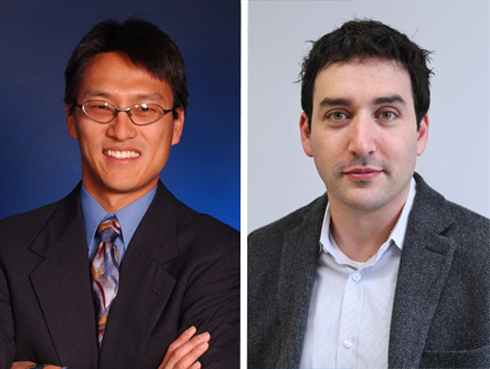Virginia Tech partners with NVIDIA Foundation to 'Compute the Cure' for Cancer

Virginia Tech researchers Wu Feng and David Mittelman have won the first worldwide research award from the NVIDIA Foundation, as part of its “Compute the Cure” program.
The award will enable them to develop a faster genome analysis platform that will make it easier for genomics researchers to identify mutations that are relevant to cancer.
This program is a pilot effort started by the NVIDIA Foundation, the philanthropic arm of the Silicon Valley-based technology firm NVIDIA. The company specializes in programmable graphics processing units (GPUs), which are used in everything from super phones to supercomputers. The Compute the Cure program has a strategic mission to leverage GPUs to support cancer researchers in the search for a cure, as well as promote cancer awareness and prevention initiatives for the greater good.
“Compute the Cure seeks to revolutionize the way that cancer biologists conduct their science by delivering a framework and toolkit of personal desktop supercomputing solutions for the analysis of genome changes from next-generation sequencing data, as a first step toward seeking a cure for cancer,” said Feng, associate professor in the Department of Computer Science and Bradley Department of Electrical and Computer Engineering in the College of Engineering at Virginia Tech. He is principal investigator on the project.
Co-investigator David Mittelman is an associate professor with the Virginia Bioinformatics Institute and the Department of Biological Sciences, part of the College of Science at Virginia Tech. Mittelman previously worked at the Human Genome Sequencing Center at Baylor College of Medicine in Houston. As the domain expert, Mittelman’s research program has explored the molecular basis for genome instability in mammalian systems and its role in diseases such as cancer. His lab also has developed sensitive methods for characterizing genome instability using next-generation whole-genome sequencing.
Using GPU-accelerated alignment and mapping software in combination with sensitive mutation detection methods, Feng and Mittelman will use the $100,000 Compute the Cure award to deliver an optimized and powerful solution for genome analysis to the research community that other investigators can build upon, to collaboratively advance the field of cancer genomics.
Feng first worked with NVIDIA in 2009, when he was one of 38 recipients worldwide to receive an NVIDIA Professor Partnership Award, designed to accelerate exploration at the frontiers of visual, parallel, and mobile computing. Feng’s Professor Partnership Award spurred his research in the parallelization and optimization of different algorithms in pairwise sequence alignment and short-read mapping onto the GPU. These are critical tasks towards understanding how genomes change during cancer.
Tonie Hansen, the director of the NVIDIA Foundation, said the tech firm’s interest in medical research always has been strong.
“NVIDIA’s Compute the Cure program combines our company’s technical focus and our people’s personal priorities,” she said. “Medical researchers the world over use GPU technology to accelerate the pace of their research. And NVIDIA employees donate generously each year to cancer research organizations, in support of a friend or family member who is fighting the disease. Compute the Cure combines these objectives into one comprehensive program.”








.jpg.transform/m-medium/image.jpg)